道教文化与汉英翻译
- 格式:doc
- 大小:68.50 KB
- 文档页数:7
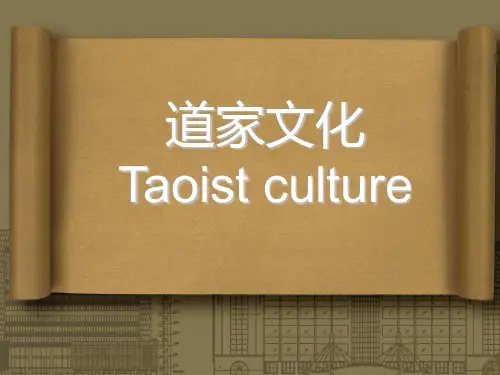
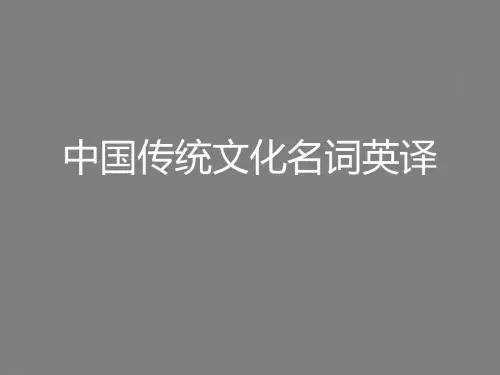
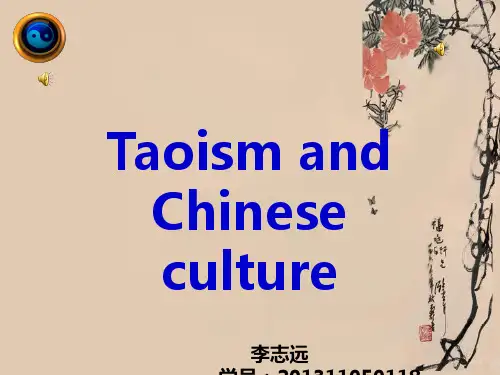
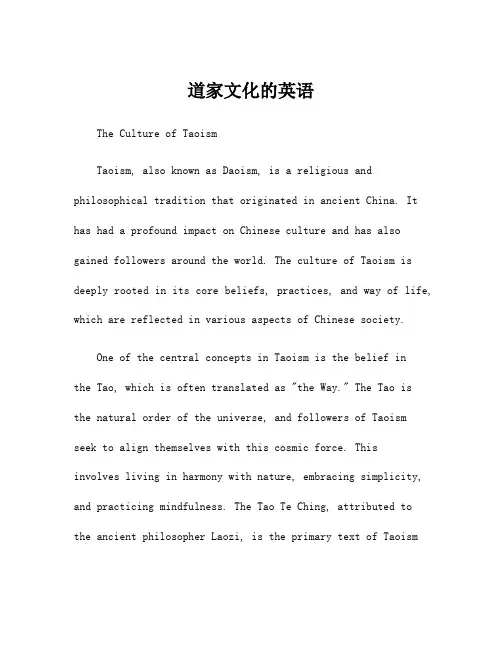
道家文化的英语The Culture of TaoismTaoism, also known as Daoism, is a religious and philosophical tradition that originated in ancient China. It has had a profound impact on Chinese culture and has also gained followers around the world. The culture of Taoism is deeply rooted in its core beliefs, practices, and way of life, which are reflected in various aspects of Chinese society.One of the central concepts in Taoism is the belief inthe Tao, which is often translated as "the Way." The Tao isthe natural order of the universe, and followers of Taoism seek to align themselves with this cosmic force. Thisinvolves living in harmony with nature, embracing simplicity, and practicing mindfulness. The Tao Te Ching, attributed tothe ancient philosopher Laozi, is the primary text of Taoismand contains teachings on the nature of the Tao and how to live in accordance with it.Taoist culture places a strong emphasis on balance and harmony. This is reflected in various aspects of Chinese art, such as calligraphy, painting, and poetry. These art forms often seek to capture the beauty of nature and thetranquility of the Tao. Taoist principles also influence Chinese medicine, which emphasizes the balance of yin and yang energies within the body to maintain health and well-being.In addition to its philosophical teachings, Taoism also includes religious practices such as the worship of deities and ancestral spirits. Taoist temples and shrines can be found throughout China, and festivals and rituals are held to honor various gods and spirits. These practices are deeply intertwined with traditional Chinese culture and have become an integral part of Chinese religious life.The influence of Taoism can also be seen in Chinese martial arts, such as Tai Chi and Qigong, which emphasize the cultivation of internal energy and a holistic approach to physical and mental well-being. These practices are not only a form of self-defense but also a means of spiritual development and personal growth.Taoist culture has left a lasting impact on Chinese society, shaping the way people live, think, and relate to the world around them. Its emphasis on harmony, balance, and interconnectedness has influenced everything from art and literature to medicine and philosophy. Even in modern China, Taoist principles continue to inform the cultural landscape and provide a source of inspiration for people seeking meaning and purpose in their lives.In conclusion, the culture of Taoism encompasses a rich tapestry of beliefs, practices, and traditions that have shaped Chinese civilization for millennia. Its influence canbe seen throughout Chinese society, from art and medicine to religion and philosophy. As Taoism continues to spread and gain followers around the world, its impact on global culture will only continue to grow.。
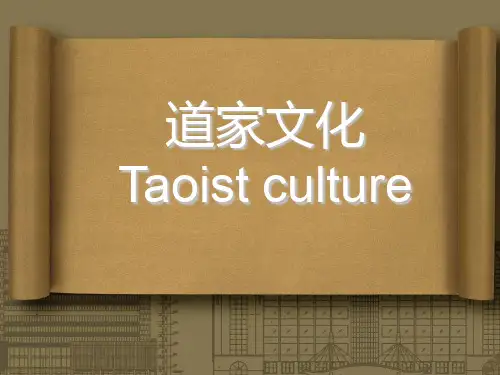
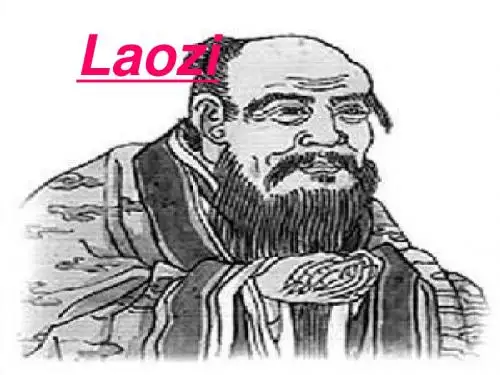
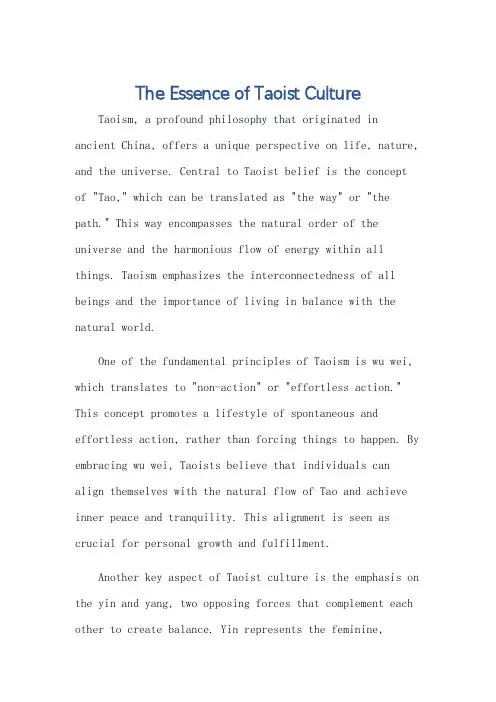
The Essence of Taoist CultureTaoism, a profound philosophy that originated in ancient China, offers a unique perspective on life, nature, and the universe. Central to Taoist belief is the concept of "Tao," which can be translated as "the way" or "the path." This way encompasses the natural order of the universe and the harmonious flow of energy within all things. Taoism emphasizes the interconnectedness of all beings and the importance of living in balance with the natural world.One of the fundamental principles of Taoism is wu wei, which translates to "non-action" or "effortless action." This concept promotes a lifestyle of spontaneous and effortless action, rather than forcing things to happen. By embracing wu wei, Taoists believe that individuals canalign themselves with the natural flow of Tao and achieve inner peace and tranquility. This alignment is seen as crucial for personal growth and fulfillment.Another key aspect of Taoist culture is the emphasis on the yin and yang, two opposing forces that complement each other to create balance. Yin represents the feminine,passive, and阴暗的 qualities, while yang represents the masculine, active, and光明的 qualities. Taoists believe that a harmonious balance between these two forces is essential for maintaining health and well-being.The Taoist approach to life also values simplicity and naturalness. Taoists advocate living a simple life, free from excessive desires and attachments. They believe that by embracing a natural lifestyle, individuals can attune themselves to the rhythms of nature and experience a deeper connection to the universe.In addition to its personal and spiritual dimensions, Taoism also has a strong ecological ethos. Taoists believe that humans should live in harmony with nature, respecting its cycles and rhythms. They advocate a lifestyle that isin tune with the natural world, minimizing harm to the environment and promoting sustainability.Taoism's influence extends beyond personal practice to encompass art, music, and philosophy. Taoist ideas have influenced many aspects of Chinese culture, including painting, poetry, and园林设计. Taoist aesthetics emphasizespontaneity, simplicity, and naturalness, reflecting the values and principles of Taoist philosophy.In conclusion, Taoist culture offers a profound understanding of life, nature, and the universe. Its emphasis on harmony, balance, and simplicity provides a valuable perspective for individuals seeking to align themselves with the natural flow of the universe and achieve inner peace and fulfillment. The principles of Taoism are not just limited to personal practice but also extend to society and the environment, promoting alifestyle that is harmonious with nature and beneficial for all beings.**道家文化的精髓**道家,这一源自古代中国的深刻哲学,为生命、自然和宇宙提供了独特的视角。
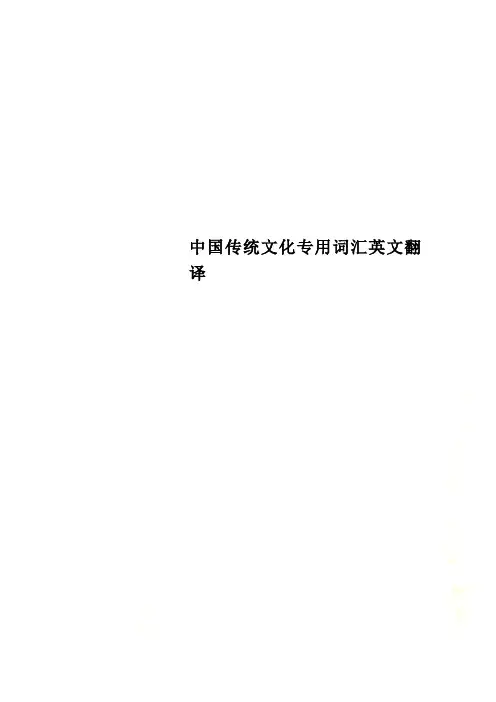
中国传统文化专用词汇英文翻译常见中国传统文化专用词汇英文翻译1、中国意念词(Chinesenesses)八卦trigram阴、阳yin, yang道Dao(cf. logo)江湖(世界) the jianghu World (the traits’ world)e.g. You can’t control everything in a traits’ world. (人在江湖,身不由己)道Daoism(Taoism)上火excessive internal heat儒学Confucianism红学(《红楼梦》研究) redology世外桃源Shangri-la or Arcadia开放kaifang (Chinese openness to the outside world)大锅饭getting an equal share regardless of the work done伤痕文学scar literature or the literature of the wounded 不搞一刀切no imposing uniformity on …合乎国情,顺乎民意to conform with the national conditions and the will of the people乱摊派,乱收费imposition of arbitrary quotas and service charge铁交椅iron (lifetime) post’s; guaranteed leading post脱贫to shake off poverty; anti-poverty治则兴,乱则衰Order leads to prosperity and chaos to decline2 、中华民族的喜庆节日(Chinese Festivial)国庆节National Day中秋节Mid-Autumn Day/Festival 春节Spring Festival元宵节Lantern Festival儿童节Children’s Day端午节Dragon Boat Festival妇女节Women’s Day泼水节Water-Splashing Day教师节Teachers’ Day五四青年节Youth Day3、中国独特的传统饮食(Unique Traditional Chinese Foods)馄饨wonton锅贴guotie (fried jiaozi)花卷steamed twisted rolls套餐set meal盒饭box lunch; Chinese take-away 米豆腐rice tofu魔芋豆腐konjak tofu米粉rice noodles 冰糖葫芦 a stick of sugar-coated haws (or apples,etc.) 火锅chafing dish八宝饭eight-treasure rice pudding粉丝glass noodles豆腐脑jellied bean curd4 、中国新兴事物(Newly Sprouted Things)中国电信China Telecom中国移动China Mobile十五计划the 10th Five-Year Plan中国电脑联网Chinanet 三峡工程the Three Gorges Project希望工程Project Hope京九铁路Beijing CKowloon Railway扶贫工程Anti-Poverty Project菜篮子工程Vegetable Basket Project温饱工程Decent-Life Project安居工程Economy Housing Project扫黄Porn-Purging Campaign西部大开发Go-West Campaign5 、特有的一些汉语词汇禅宗Zen Buddhism禅dhyana; dhgaya混沌chaos道Daosim, the way and its power四谛Four Noble Truth 八正道Eightfold Path无常anity五行说Theory of Five Elements无我anatman坐禅metta or transcendental meditation空sunyata虚无nothingness双喜double happiness(中),a doubled stroke of luck(英)小品witty skits相声cross-talk噱头;掉包袱gimmick, stunt夜猫子night people; night-owls本命年this animal year of sb.处世之道philosophy of life姻缘yinyuan(prefixed fate of marriage)还愿redeem a wish (vows)6 、具有文化特色的现代表述大陆中国Mainland China红宝书little red book红色中国socialist China四化Four Modernizations终生职业job-for-life铁饭碗iron rice bowl大锅饭communal pot关系户closely-related units外出打工人员migrant workers关系网personal nets, closely-knitted guild五讲(讲文明、讲礼貌、讲卫生、讲秩序、讲道德):the Five Merits focus on decorum, manners, hygiene, disciplines and morals四美(心灵美、语言美、行为美、环境美):the Four Virtues are golden heart, refined language, civilized behavior, and green environment7 、中国古代独特事物(Unique Ancient Chinese Items)宣纸rice paper衙门yamen叩头kowtow孔子Confucius 牌楼pailou;pai-loo武术wushu(Chinese Martial Arts) 功夫kungfu ;kung fu中庸the way of medium (cf. Golden Means)中和harmony (zhonghe)孝顺to show filial obedience孝子dutiful son家长family head三纲:君为臣纲,父为子纲,夫为妻纲three cardinal guides: ruler guides subject, father guides son husband guides wife五常:仁、义、理、智、信five constant virtues: benevolence (humanity), righteousness, propriety, wisdom and fidelity 八股文eight-legged essays多子多福:The more sons/children, the more blessing/ great happiness养儿防老:raising sons to support one in one’s old age8、近一季度见诸报端的中国现代特色词汇翻译基层监督grass-roots supervision基础税率base tariff level婚介所matrimonial agency婚外恋extramarital love婚纱摄影bride photo黑心棉shoddy cotton机器阅卷machine scoring即开型奖券scratch-open ticket/lottery 集中精力把经济建设搞上去go all out for economic development价格听证会public price hearings甲A球队Division A Soccer Team家政服务household management service加强舆论监督ensure the correct orientation is maintained in public opinion假帐accounting fraud叫板challenge; pick a quarrel矫情use lame arguments渐进式台独gradual Taiwan independence借调temporarily transfer扩大中等收入者比重Raise the proportion of the middle-income group.扩大内需,刺激消费expand domestic demand and consumption“民族传统”的必背考点一、对龙图腾他的崇拜在中国大约已绵延了八千多年。
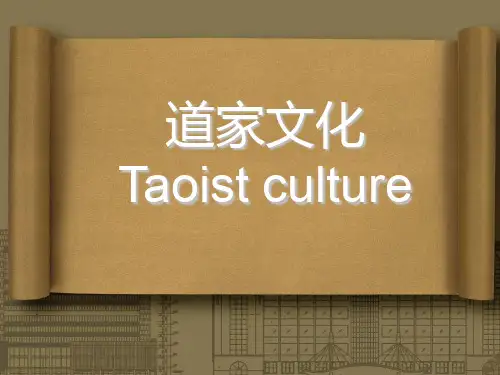
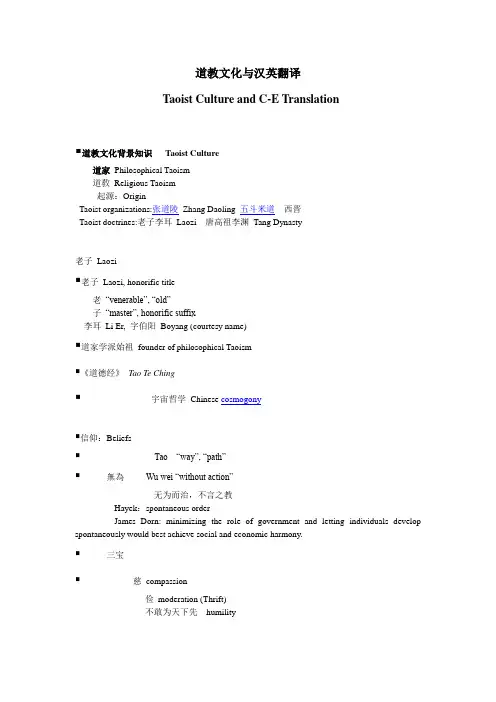
道教文化与汉英翻译Taoist Culture and C-E Translation▪道教文化背景知识Taoist Culture道家Philosophical Taoism道敎Religious Taoism起源:OriginTaoist organizations:张道陵Zhang Daoling 五斗米道西晋Taoist doctrines:老子李耳Laozi 唐高祖李渊Tang Dynasty老子Laozi▪老子Laozi, honorific title老“venerable”, “old”子“master”, honorific suffix李耳Li Er, 字伯阳Boyang (courtesy name)▪道家学派始祖founder of philosophical Taoism▪《道德经》Tao Te Ching▪宇宙哲学Chinese cosmogony▪信仰:Beliefs▪Tao “way”, “path”▪無為Wu wei “without action”无为而治,不言之教Hayek:spontaneous orderJames Dorn: minimizing the role of government and letting individuals develop spontaneously would best achieve social and economic harmony.▪三宝▪慈compassion俭moderation (Thrift)不敢为天下先humility▪朴simplicity, the primordial state of tao▪去甚,去奢,去泰Discarding extremes, extravagance and excess▪少私寡欲wipe out selfish desires▪清静恬淡live a quiet life/ quiet world▪知足常乐the attitude of contentment on what one owns道教经典英译▪道生一,一生二,二生三,三生万物。
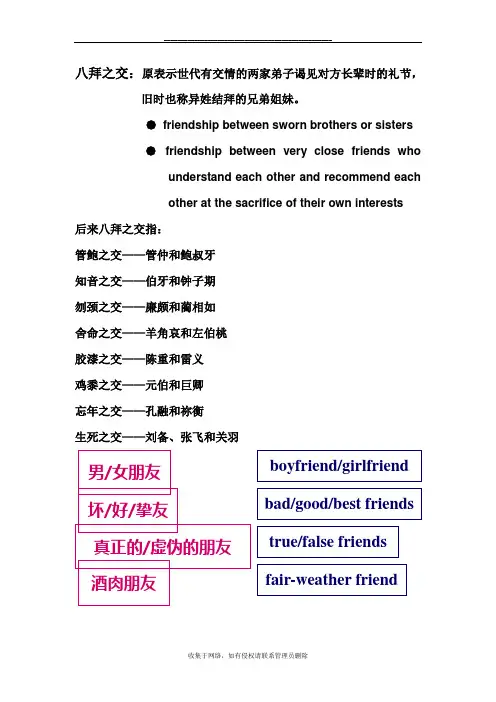
八拜之交:原表示世代有交情的两家弟子谒见对方长辈时的礼节,旧时也称异姓结拜的兄弟姐妹。
●friendship between sworn brothers or sisters●friendship between very close friends whounderstand each other and recommend eachother at the sacrifice of their own interests莫逆之交:bosom friends总角之交:friendship between people who are friends since childhood一般作宾语,指儿时的朋友。
总角:古代未成年的人把头发扎成髻。
借指童年时期,幼年。
总角是八九岁至十三四岁的少年,古代儿童将头发分作左右两半,在头顶各扎成一个结,形如两个羊角,故称“总角”。
贫贱之交:friendship between people who are poverty-stricken and from humble circumstances杵臼之交:friendship between people who do not care about the financial condition and social status of each other 杵:舂米的木棒;臼:石臼。
比喻交朋友不计较贫富和身分。
君子之交:friendship between gentlemen小人之交:friendship between villains狐朋狗友:people who often gather together doing something meaningless and even illegal棋友/牌友/球友:people who often meet to play chess, poker, ball. etc.战友:people who get to know each other while serving in the same army unit普通老百姓交的朋友谓“布衣之交”;有钱人与没钱人交朋友谓“车笠之交”;在逆境中结交的朋友称“患难之交”;吃喝玩乐结交的朋友称“酒肉之交”;年岁差别大,行辈不同而交情深厚的朋友称“忘年之交”;幼年相交的朋友称“竹马之交”;交情深厚的朋友谓“肺腑之交”;亲密无间的朋友谓“胶漆之交”;生死与共的朋友谓“生死之交”;情投意合的朋友称“莫逆之交”;哪怕砍头也不改变友谊的朋友称“刎颈之交”;无意中相遇而结成的朋友称“邂逅之交”;在道义上互相支持的朋友称“君子之交”;只见过一次面,交情不深的朋友称“一面之交”;仅点头打招呼,感情不深的朋友称“点头之交”;平淡而浮泛交往的朋友称“泛泛之交”;见过面但不熟悉的人称“半面之交”;旧时结拜的兄弟姊妹称“八拜之交”;交友不嫌贫贱称“杵逆之交”;宝贵而有价值的交往称“金玉之交”。
道教英语道教词汇英文翻译对照 [Religious Terms - Taoism]八节斋 The Fasts of the Eight Seasons; The Fasts of the Lunar Periods八仙 the eight immortals半仙 demigod避邪符 phylactery [a charm to drive away demon influences]卜卦用签 lots [used in divination]财神 God of Wealth曹国舅 Ts`ao Kuo-chiu长生不老 agelessness; everlasting life城隍 City God赤脚大仙 barefoot immortal [reference to Emperor Sen Tsung of the Sung Dynasty]道士 Taoist对签号 checking lots法术 supernatural feat返老还童 rejuvenescence; renewing one's youth符 charm福神 God of Fortune; God of Blessedings供斋 to offer a vegetarian meal韩湘子 Han Hsiang-tzu何仙姑 Ho Hsien-ku狐仙 fox spirit; fox fairy道教神仙谱系1) religion of Taoism fairy pedigree道教神仙谱系2) Taoism道教1.A Brief Discussion on the Taoist Thoughts,Taoism and Its Ways of Health Preserving;简论道家思想、道教与养生2.The Influence of Taoism "Fuqi Daoyin" to the Traditional Chinese Medical Thought of Keeping in Good Health by "Heyushushu";论道教服气导引术对中医“和于术数”养生思想的影响3) Daoism道教1.Doctor Mingtang Theory and Daoism Mingtang Symbol Regimen;医家明堂论与道教的明堂符号养生法2.On Gehong s Internal Pellet Vital Power Conservation in Daoism;论葛洪的道教内丹养生学3.Comparision of the Cosmos Evolution Idea of Daoism and Big Bang;道教宇宙演化观与大爆炸宇宙论之比较4) Taoist道教1.The Taoist meditation and ancient creative imagination of literature and art;论道教“存思”与古代文艺创作想象2.Discussion about the History-Intoned Group Poems of Taoist Poet Wujun of the Tang Dynasty;试论唐代道教诗人吴筠的咏史组诗3.The Spreading of Taoist and the Fable of Pangu in Ethnic Minority Groups;道教传播与少数民族盘古神话5) religious Daoism道教1.Both philosophical Daoism and religious Daoism,they hold tourism aesthetics which insists that man is an integral part of nature.道家、道教文化是中国传统文化的三大组成部分之一,理应成为我国休闲旅游业的重要内核。
Title: Exploring Taoist Culture: An Insight into Ancient WisdomTaoism, originating in ancient China, is a philosophical and spiritual tradition that has profoundly influenced Chinese culture and society for millennia. Rooted in the teachings of Laozi and Zhuangzi, Taoism espouses harmony with nature, simplicity, and the cultivation of inner peace. In this essay, we will delve into the rich tapestry of Taoist culture, exploring its core principles, practices, and enduring legacy.1. **The Tao and the Way of Nature**: At the heart of Taoist philosophy is the concept of the Tao, often translated as "the Way." The Tao represents the underlying natural order and the principle of effortless action. Taoists believe in aligning oneself with the flow of the Tao, embracing spontaneity, and letting go of rigid expectations and desires. This harmonious integration with nature is seen as the key to inner peace and spiritual enlightenment.2. **Wu Wei and Effortless Action**: Central to Taoist ethics is the principle of Wu Wei, or "non-action." Contrary to Western notions of striving and exertion, Wu Wei emphasizes the art of effortless action and spontaneous behavior. By relinquishing the ego and allowing events to unfold naturally, individuals can achieve a state of flow and harmony with the Tao.3. **Yin-Yang and the Balance of Opposites**: The concept of Yin and Yang, symbolized by the interplay of complementary forces such as light and dark, feminine and masculine, is fundamental to Taoist cosmology. Taoists view reality as a dynamic equilibrium of opposites, where harmony arises from the balance and integration of polarities. This philosophy influences various aspects of Chinese culture, including traditional Chinese medicine, feng shui, and martial arts.4. **Cultivation Practices: Meditation and Tai Chi**: Taoist culture encompasses a range of spiritual practices aimed at cultivating inner vitality and attaining spiritual enlightenment. Meditation, known as "dhyana" in Taoist tradition, is a cornerstone practice for quieting the mind, deepening self-awareness, and connecting with the Tao. Tai Chi, a graceful form of martial arts, is another embodiment of Taoist principles, emphasizing fluidity, balance, and harmony of movement.5. **Nature Worship and Rituals**: Taoism reveres nature as a sacred manifestation of the Tao, and many Taoist rituals are centered around honoring the natural world. From simple acts of reverence, such as offering incense to mountains and rivers, to elaborate ceremonies celebrating seasonal cycles and cosmic forces, Taoist rituals serve to cultivate gratitude, humility, and ecological consciousness.6. **Literary and Artistic Heritage**: Taoist culture has left an indelible mark on Chinese literature, art, and aesthetics. Classic Taoist texts, such as the "Tao Te Ching" and the "Zhuangzi," are revered as literary masterpieces and continue to inspire generations with their profound wisdom and poetic beauty. Taoist themes are also prevalent in traditional Chinese painting, calligraphy, and landscape design, reflecting the reverence for simplicity, spontaneity, and the beauty of the natural world.In conclusion, Taoist culture offers a profound worldview and a timeless wisdom that resonates with people across cultures and generations. Through its emphasis on harmony with nature, simplicity, and inner cultivation, Taoism continues to enrich the lives of millions and serves as a guiding light in the quest for meaning, balance, and spiritual fulfillment.。
道教文化与汉英翻译Taoist Culture and C-E Translation▪道教文化背景知识Taoist Culture道家Philosophical Taoism道敎Religious Taoism起源:OriginTaoist organizations:张道陵Zhang Daoling 五斗米道西晋Taoist doctrines:老子李耳Laozi 唐高祖李渊Tang Dynasty老子Laozi▪老子Laozi, honorific title老“venerable”, “old”子“master”, honorific suffix李耳Li Er, 字伯阳Boyang (courtesy name)▪道家学派始祖founder of philosophical Taoism▪《道德经》Tao Te Ching▪宇宙哲学Chinese cosmogony▪信仰:Beliefs▪Tao “way”, “path”▪無為Wu wei “without action”无为而治,不言之教Hayek:spontaneous orderJames Dorn: minimizing the role of government and letting individuals develop spontaneously would best achieve social and economic harmony.▪三宝▪慈compassion俭moderation (Thrift)不敢为天下先humility▪朴simplicity, the primordial state of tao▪去甚,去奢,去泰Discarding extremes, extravagance and excess▪少私寡欲wipe out selfish desires▪清静恬淡live a quiet life/ quiet world▪知足常乐the attitude of contentment on what one owns道教经典英译▪道生一,一生二,二生三,三生万物。
▪The Tao gives birth to One. One gives birth to Two. Two give birth to Three. Three give birth to all things.▪五色令人目盲,五音令人耳聋,五味令人口爽,驰骋田猎令人心发狂。
▪Iridescent colors cause blindness. Beautiful music causes deafness; delicious food causes loss of taste. Racing and hunting cause madness.▪知足之足,常足矣.▪The with knowing contentment is always contented.▪知足不辱,知止不殆.▪whoever is contented will meet no disgrace, whoever knows when and where to stop will meet no danger.▪见素抱朴,少私寡欲▪manifest plainness, embrace simplicity, reduce selfishness, and hold few desires▪出家之人,恶衣恶食,不积财,恐害身损福也。
▪Taoists make light clothing and food and they accumulate no wealth, because these might damage health and fortunes.▪全真七子之一▪——丘处机▪Qiu Chuji▪道人不厌贫,贫乃养生之本。
饥则餐一钵粥,睡来铺一束草,褴褴褛褛以度朝夕,正是道人活计。
▪As Ma Yu, a famous Taoist of the School, put it, “Taoists are no t tired of deficiency, as deficiency is the root to preserve one‟s health. When feeling hungry, they eat a bowl of porridge. When tired, they sleep on a sheet of grass. They pass the days and nights in shabby clothes. This is exactly what Taoists must do i n life.”▪“全真七子”之一▪——马钰▪Mu yu文学作品中的道教文化英译▪《西游记》The Journey to the West▪日迸裂,产一石卵,……目运两道金光,射冲斗府。
惊动高天上圣大慈仁者玉皇大天尊玄穹高上帝,驾座金阙云宫灵霄宝殿,聚集仙卿,见有金光焰焰,即命千里眼、顺风耳开南天门观看。
(第一回灵根育孕源流出心性修持大道生)▪As his eyes moved, two beams of golden light shot towards the Pole Star palace and startled the Supreme Heavenly Sage, the Greatly Compassionate Jade Emperor of the Azure Vault of Heaven, who was sitting surrounded by his immortal ministers on his throne in the Hall of Miraculous Mist in the Golden-gated Cloud Palace.▪祖师道:“…道‟字门中有三百六十傍门,傍门皆有正果。
不知你学那一门哩?”悟空道:“凭尊师意思。
弟子倾心听从。
”祖师道:“我教你个…术‟字门中之道,如何?”悟空道:“术门之道怎么说?”祖师道:“术字门中,乃是些请仙扶鸾,问卜揲蓍,能知趋吉避凶之理。
” ▪"There are three hundred and sixty side-entrances to the Way, and they all lead to a True Result," the Patriarch said. "Which branch would you like to study?"▪祖师又道:“教你…流‟字门中之道,如何?”悟空又问:“流字门中,是甚义理?”祖师道:“流字门中,乃是儒家、释家、道家、阴阳家、墨家、医家,或看经,或念佛,并朝真降圣之类。
” …………祖师道:“若要长生,也似…壁里安柱‟▪"Shall I teach you the Way of Sects?" the Patriarch asked.▪"What are the principles of the Sects?" said Monkey.▪"Within the branch of Sects, there is Confucianism, Buddhism, Taoism, the study of the Negative and Positive, Mohism, medicine, reading scriptures and chanting the name of a Buddha. You can also summon Immortals and Sages with this branch.“▪the Patriarch replied, "is like 'putting a pillar in the wall.'▪祖师道:“教你…静‟字门中之道,如何?”悟空道:“静字门中,是甚正果?”祖师道:“此是休粮守谷,清静无为,参禅打坐,戒语持斋,或睡功,或立功,并入定坐关之类。
” … …祖师道:“也似…窑头土坯‟▪"Shall I teach you the Way of Silence?" the Patriarch then asked.▪"What True Result can be got from Silence?" said Monkey.▪"It involves abstaining from grain, preserving one's essence, silence, inaction, meditation, abstaining from speech, eating vegetarian food, performing certain exercises when asleep or standing up, going into trances, and being walled up in total isolation.“▪"It's like building the top of a kiln with sun-dried bricks," the patriarch replied.▪祖师道:“教你…动‟字门中之道,如何?”悟空道:“动门之道,却又怎样?”祖师道:“此是有为有作,采阴补阳,攀弓踏弩,摩脐过气,用方炮制,烧茅打鼎,进红铅,炼秋石,并服妇乳之类。
”… …祖师道:“此欲长生,亦如…水中捞月‟▪"Shall I teach you the Way of Action then?" the Patriarch asked.▪"What's that like?" Monkey asked.▪"It involves acting and doing, extracting the Negative and building up the Positive, drawing the bow and loading the crossbow, rubbing the navel to make the subtle humors flow, refining elixirs according to formulae, lighting fires under cauldrons, consuming 'Red lead,' purifying 'Autumn Stone,' and drinking women's milk.“▪"To try and attain immortality that way is like 'lifting the moon out of water.▪行者道:“这上面坐的是甚么菩萨?”八戒笑道:“三清也认不得,却认做甚么菩萨!”行者道:“那三清?八戒道:“中间的是元始天尊,左边的是灵宝道君,右边的是太上老君。